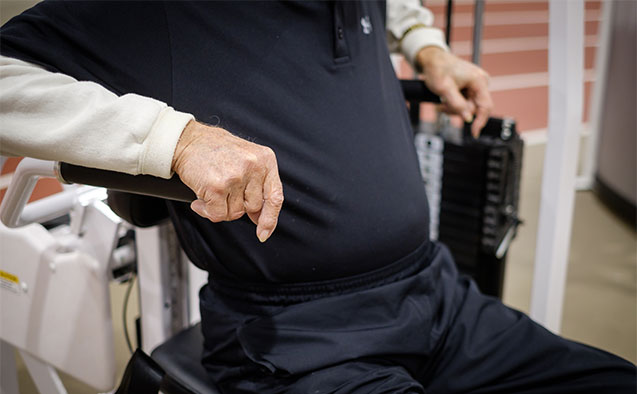New Year’s resolution for older adults: Lose weight the right way

If shedding some of those extra pounds is your goal for the new year, are you sure you’re losing the right kind of weight?
Health and exercise science professor Kristen Beavers of Wake Forest University has a challenge for older adults resolving to drop some pounds in 2018: Focus on the fat – don’t shed muscle and bone, too.
Preserving muscle and bone is just as important for continued independent living as fat loss is for heart health, Beavers said.
“Everybody says that they want to lose weight, but what they really mean is that they want to lose fat. And for older adults in particular, maintaining muscle is a vital part of any plan to lose weight.” Kristen Beavers, assistant professor of health and exercise science
Beavers studies how to optimize weight loss for older adults, tinkering with nutrition and exercise to help seniors stave off disease and disability. Her ultimate goal is to enable people to age in place as long as possible.
Her most recent study, published in the journal Obesity, showed that adding resistance training such as weight-machine workouts helped obese seniors both lose weight and preserve muscle mass, more so than walking.
So that’s what she recommends for any weight loss resolution on your to-do list for 2018.
And if a gym membership isn’t for you, don’t worry. Beavers said a home workout with elastic therapy bands such as Thera-Bands can do the trick, too.
Or try a consultation with a fitness expert at a community facility such as the YMCA or a senior center, both of which offer free or reduced rates for seniors.
Just be sure to “develop the exercise prescription with reality in mind,” she said, so your New Year’s resolution doesn’t fizzle out by early February.
“Maintaining lost weight is just as important as the initial weight loss,” said Beavers, “especially since older adults are more likely to regain fat mass than muscle or bone.”
The good news is that exercise is really helpful at promoting weight loss maintenance as well, so incorporating resistance training into your weight loss plan is a recipe for success.
Beavers’ upcoming research looks at how weight loss affects bone health in older adults with obesity – another area of high concern in terms of disability risk.
Beavers is an assistant professor of health and exercise science at Wake Forest University.
Losing Fat vs. Losing Muscle
Findings from Kristen Beavers’ most recent study of more than 200 overweight seniors:
- Total fat loss was much greater when participants combined diet plus walking (about 16 pounds) and diet plus weight training (about 17 pounds). Diet alone resulted in about 10 pounds of fat lost over 18 months.
- Muscle mass loss was greatest with diet plus walking (about 4 pounds) compared with diet alone or diet plus weight training (each about 2 pounds). Put another way, the percentage of weight loss coming from muscle mass was 20% in the weight loss plus walking group, 16% in the weight loss alone group, and 10% in the weight loss plus weight training group.
- Loss of fat was associated with faster walking speed, while loss of muscle was associated with reduced knee strength.
Categories: Research & Discovery
Wake Forest News
336.758.5237
media@wfu.edu
Meet the News Team
Headlines
Wake Forest in the News
Wake Forest regularly appears in media outlets around the world.





